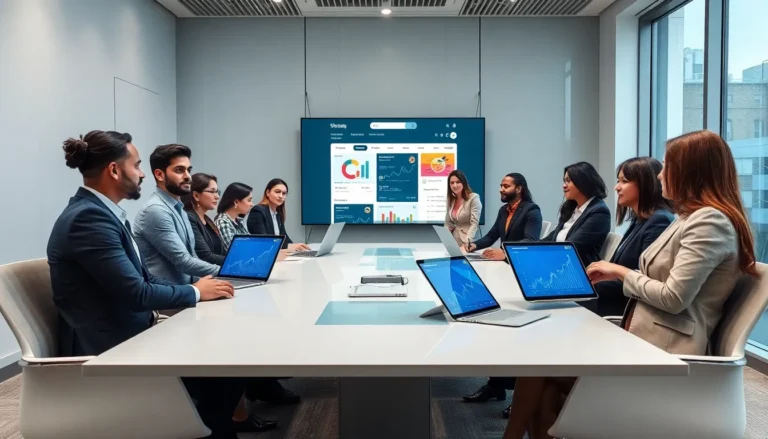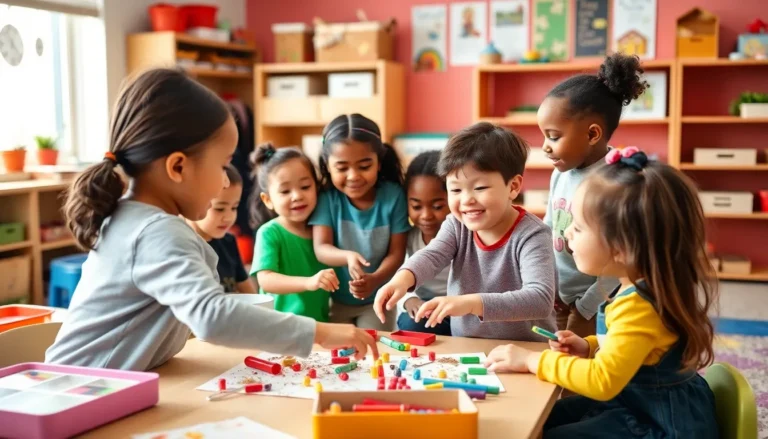Table of Contents
ToggleIn a world where toddlers reign supreme, the Montessori classroom stands as their kingdom of exploration and discovery. Imagine a place where tiny hands can touch, feel, and learn at their own pace, all while channeling their inner genius. It’s not just about finger painting and snack time; it’s about fostering independence and curiosity in a fun, engaging environment.
Overview of Montessori Toddler Classroom
Montessori toddler classrooms create an environment that encourages exploration and independence. Children engage with carefully curated materials that promote sensory experiences and cognitive development. Each area of the classroom serves a specific purpose, from practical life skills to language and mathematics.
Learning materials include simple everyday objects. For example, toddler-sized utensils teach self-sufficiency during snack time. This hands-on approach supports the development of fine motor skills and builds confidence in completing tasks.
Classrooms utilize open layouts, allowing children to navigate freely. Mobility encourages toddlers to follow their interests and make choices about their activities. Educators observe this process, stepping back to ensure learning occurs at the child’s pace.
Interaction fosters social skills among peers. Group activities encourage cooperation and communication, allowing toddlers to develop essential social bonds. Mixed-age groups often appear in Montessori settings, enabling younger children to learn from older peers.
Routine plays a crucial role in Montessori education. Daily schedules provide children with a sense of security while allowing flexibility for individual exploration. This balance supports both structure and freedom, catering to varied learning preferences.
Montessori toddler classrooms focus on autonomy, sensory engagement, and peer interactions. These elements combine to create a rich educational environment, ensuring that each toddler thrives in their learning journey.
Key Principles of Montessori Education
Montessori education focuses on principles that nurture toddlers’ growth and autonomy. This approach builds a solid foundation for lifelong learning.
Child-Centered Learning
Child-centered learning places the toddler at the heart of the educational experience. Each child engages in activities that align with their interests and developmental pace. Educators facilitate this process by observing, guiding, and providing necessary resources. Independence is encouraged, granting toddlers choices in their daily routines. Every child discovers their strengths and preferences through exploration and self-direction. This emphasis on personalized experiences fosters a deep sense of ownership in their learning journey. Educators respect each child’s unique path, ensuring an environment conducive to intrinsic motivation.
Hands-On Experiences
Hands-on experiences are vital in a Montessori toddler classroom. Engaging with tactile materials enhances learning and development. Activity choices range from practical life skills to artistic exploration, promoting cognitive growth. Materials designed for toddlers encourage fine motor skills, coordination, and concentration. Direct interaction with learning resources enables children to grasp complex concepts effectively. Such experiences help solidify knowledge through practice and repetition. Concrete learning fosters an appreciation for the process of discovery and problem-solving. This immersive approach cultivates curiosity and a love for learning.
Environment Setup
Creating a Montessori toddler classroom emphasizes the importance of a carefully designed environment. This space fosters independence and exploration, making each element purposeful.
Classroom Design
Classroom design features an open layout that encourages navigation and choice. Children find accessible shelves with materials arranged for independent use. Each area serves a specific function, such as practical life skills or sensory experiences. Natural lighting enhances the atmosphere, supporting a calm and inviting space for exploration. Soft colors contribute to a soothing environment, promoting focus and engagement. Adjustable furniture caters to varying heights, ensuring comfort and accessibility for all toddlers.
Materials and Resources
Materials include toddler-sized utensils and sensory items that support fine motor skill development. Engaging with these resources offers hands-on experiences crucial for cognitive growth. Montessori classrooms utilize natural materials, encouraging children to connect with their environment. Carefully selected resources align with children’s interests, prompting them to participate actively. Learning tools promote repetition, solidifying knowledge through practice. A variety of educational materials helps foster curiosity, inviting children to explore concepts in ways that resonate with them.
Role of the Educator
Educators in a Montessori toddler classroom play a crucial role. They guide and support children’s learning while fostering a sense of independence.
Facilitator vs. Instructor
In a Montessori setting, educators act as facilitators rather than traditional instructors. They observe children’s interactions, allowing them to explore materials freely. This approach respects individual learning styles, promoting self-discovery. Creating a safe environment encourages toddlers to take risks. Their role involves offering gentle guidance instead of direct instruction. Facilitators encourage autonomy while ensuring safety and support. The focus shifts from teaching facts to fostering skills and curiosity.
Creating a Supportive Atmosphere
The classroom atmosphere significantly impacts toddler learning. A supportive environment empowers children to explore and engage. Soft lighting and inviting colors help create a calming space. Accessible materials arranged on low shelves promote independence. Encouragement and positive reinforcement from educators enhance children’s confidence. Additionally, fostering respectful relationships among peers boosts social development. In this nurturing atmosphere, toddlers feel secure to express themselves and pursue their interests. Through careful observation, educators adjust the environment to meet children’s evolving needs. Each interaction cultivates a love for learning and exploration.
Benefits of Montessori Toddler Classrooms
Montessori toddler classrooms enhance independent learning. Children engage in hands-on activities that promote cognitive development and sensory exploration. An environment designed for autonomy allows toddlers to learn at their own pace.
Freedom to navigate the classroom serves as a significant benefit. Open layouts encourage toddlers to choose their activities based on their interests. Children also develop social skills through purposeful interaction with peers, fostering cooperation and communication.
Routine creates a safe space for exploration. Consistent schedules provide security while allowing flexibility. This balance stimulates each child’s unique learning style, ensuring they thrive.
Carefully curated materials play a vital role. Resources like toddler-sized utensils and sensory items focus on practical life skills and fine motor development. Engaging with these materials not only builds self-sufficiency but also encourages curiosity and a love for learning.
Educators serve as facilitators in this environment. By observing and guiding toddlers, they support personal interests and developmental stages. Respecting individual learning paths boosts confidence and fosters a sense of ownership over the learning process.
The role of mixed-age groups benefits younger children. Observing older peers offers valuable learning opportunities and models social behavior. This dynamic aids in promoting emotional intelligence and empathy among all children.
Overall, Montessori toddler classrooms provide a rich educational experience. Emphasis on autonomy, tailored learning, and peer interactions cultivates an environment where curiosity thrives and children feel empowered to explore.
Montessori toddler classrooms offer a nurturing environment that prioritizes exploration and independence. By allowing children to engage with carefully selected materials and activities, these classrooms support cognitive and social development in a unique way. The emphasis on child-centered learning fosters a sense of ownership over their educational journey.
Educators play a vital role in guiding toddlers while respecting their individual learning styles. This balance between structure and freedom creates a safe space for children to thrive. As toddlers navigate their classroom, they not only develop essential skills but also cultivate a lifelong love for learning. The Montessori approach truly empowers young learners to explore their interests and grow at their own pace.








